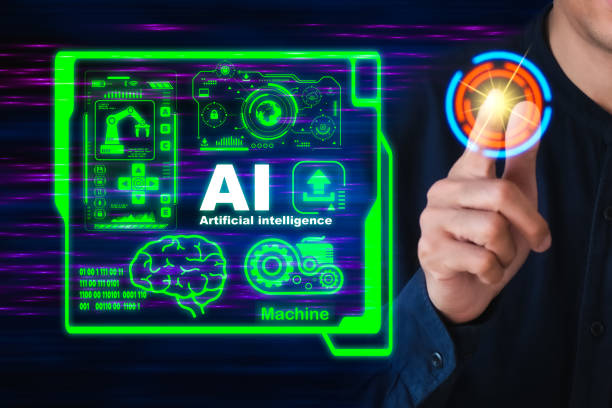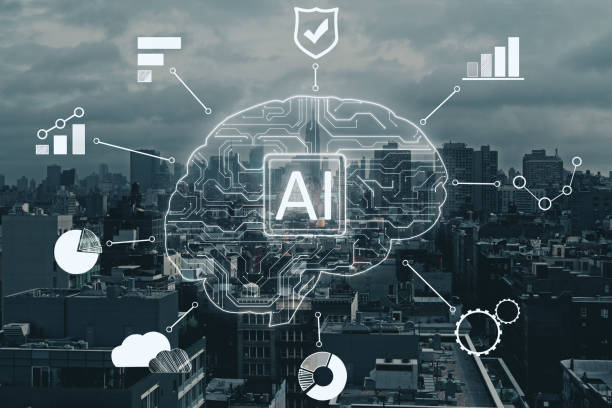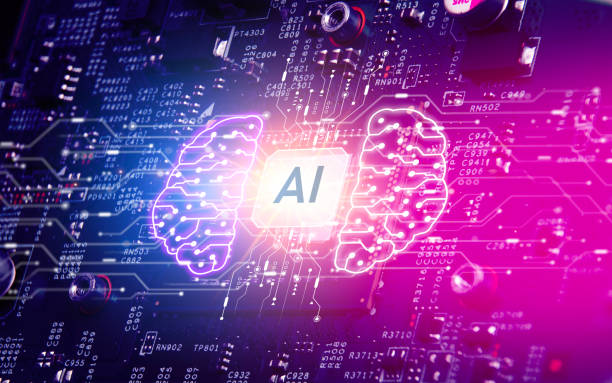### What is Artificial Intelligence and What are Its Applications?
Artificial Intelligence (AI) is a branch of computer science that deals with building machines capable of performing tasks that typically require human intelligence.
These tasks include learning, problem-solving, pattern recognition, natural language understanding, and decision-making.
The applications of #artificial_intelligence are very broad and have affected almost all aspects of our lives.
These applications include:
- Medicine: disease diagnosis, drug development, robotic surgery
- Finance: fraud detection, risk management, algorithmic trading
- Transportation: self-driving cars, traffic management, route optimization
- Education: personalized learning systems, intelligent tutoring assistants
- Manufacturing: automation of production lines, quality control, equipment failure prediction
In fact, artificial intelligence is creating a massive transformation in various industries and is expected to play a much more important role in our lives in the future.
Artificial Intelligence, by mimicking human intelligence processes by machines, seeks to solve complex problems and provide innovative solutions.
Does your current company website present a worthy image of your brand and attract new customers?
If not, turn this challenge into an opportunity with Rasaweb’s professional corporate website design services.
✅ Dramatically improves your brand’s credibility and image.
✅ Smooths the path to attracting new leads and customers for you.
⚡ Contact Rasaweb now for a free and expert consultation!
Getting Acquainted with Key Concepts of Artificial Intelligence
To better understand artificial intelligence, it is necessary to become familiar with some of its key concepts:
- Machine Learning: Algorithms that allow machines to learn from data and improve their performance without explicit programming.
Machine Learning is one of the main topics in artificial intelligence. - Neural Networks: Models inspired by the structure of the human brain that are used to process complex information and recognize patterns.
- Natural Language Processing: The ability of machines to understand and generate human language.
Natural Language Processing makes human-machine interaction natural. - Computer Vision: The ability of machines to see and interpret images and videos.
Click here to preview your posts with PRO themes ››
These concepts form the main foundations of artificial intelligence, and understanding them is essential for entering this field.
Artificial intelligence, using these concepts, gains the ability to solve complex problems.
Types of Machine Learning Algorithms
Machine learning algorithms are divided into three main categories:
- Supervised Learning: In this type of learning, the algorithm is trained using labeled data.
That is, the data has specific inputs and outputs, and the algorithm tries to learn the relationship between them. - Unsupervised Learning: In this type of learning, the algorithm is trained using unlabeled data.
The goal of the algorithm is to find patterns and structures in the data. - Reinforcement Learning: In this type of learning, the algorithm, by interacting with the environment, tries to learn the best strategy to achieve a specific goal.
Each of these types of algorithms has its own specific applications and is used to solve different problems.
Choosing the appropriate type of algorithm depends on the type of data and the problem at hand.
Artificial intelligence, by using these algorithms, gains the ability to predict and make decisions.
| Learning Type | Description | Example |
|---|---|---|
| Supervised | Training with labeled data | Spam email detection |
| Unsupervised | Finding patterns in unlabeled data | Customer segmentation |
| Reinforcement | Learning by interacting with the environment | Playing games |
Applications of Artificial Intelligence in Industry
Industry is one of the areas where artificial intelligence has created many transformations.
Some of the applications of artificial intelligence in industry include:
- Automation of production lines: Robots and intelligent systems can automatically perform repetitive and dangerous tasks.
- Quality control: Machine vision systems can inspect products and identify defects.
- Equipment failure prediction: Machine learning algorithms can analyze sensor data and predict equipment failure.
- Supply chain optimization: Intelligent systems can optimize the supply chain and reduce costs.
By increasing efficiency and reducing costs, artificial intelligence helps industries become more competitive.
Also, artificial intelligence can play an important role in improving safety and reducing hazards in industrial environments.
Using artificial intelligence in industry leads to process improvement and increased productivity.
Worried about losing customers because you don’t have a professional online store?
Forget those worries by designing an online store with Rasaweb!
✅ Significant increase in sales and visitor-to-customer conversion rate
✅ Professional and user-friendly design that earns customer trust
⚡ Get free advice from Rasaweb
Artificial Intelligence in Medicine and Healthcare
Medicine and healthcare are also among the areas where artificial intelligence has many applications.
Some of these applications include:
- Disease Diagnosis: Machine learning algorithms can analyze medical images and diagnose diseases with high accuracy.
- Drug Development: Artificial intelligence can help in identifying drug targets and designing new drugs.
- Robotic Surgery: Surgical robots can perform complex surgeries with greater precision.
- Medical Records Management: Intelligent systems can manage medical records and quickly make needed information available to doctors.
By increasing diagnostic accuracy and speed, artificial intelligence helps doctors treat patients better.
Also, artificial intelligence can play an important role in reducing treatment costs and improving access to healthcare services.
Using Artificial Intelligence in medicine leads to improved quality of life for patients.
Artificial Intelligence and the Future of Work
Artificial intelligence is changing the job landscape and threatens some jobs, while creating new ones.
Some of the impacts of artificial intelligence on the future of work include:
- Automation of Repetitive Jobs: Tasks that are repetitive and predictable are likely to be performed by machines.
- Creating New Jobs: Artificial intelligence requires the creation of jobs that require human skills such as creativity, critical thinking, and problem-solving.
- Changing the Nature of Existing Jobs: Many jobs will require new skills to be able to work with intelligent systems.
To succeed in the future of work, we need to acquire the skills needed to work with artificial intelligence and adapt to new changes.
Continuous learning and skill development are the keys to success in the world of artificial intelligence.
Artificial intelligence provides new opportunities for creative and innovative people.
Challenges and Limitations of Artificial Intelligence
Despite its many potentials, artificial intelligence also faces challenges and limitations:
- Need for Lots of Data: Machine learning algorithms need a lot of data for training.
- Bias: If the training data is biased, the algorithm will also be biased.
- Interpretability: Understanding how complex algorithms make decisions is difficult.
- Ethical Issues: The use of artificial intelligence can create new ethical issues, such as privacy and discrimination.
To solve these challenges, more research is needed in the field of artificial intelligence, and appropriate laws and regulations must be developed for its use.
Paying attention to ethical and social issues is necessary for the responsible use of artificial intelligence.
The development of artificial intelligence should be done with the interests of society in mind.
| Challenge | Description | Solution |
|---|---|---|
| Need for Data | Algorithms need a lot of data | Collecting and processing more data |
| Bias | Data may be biased | Using diverse data and removing bias |
| Interpretability | Understanding algorithm decision-making is difficult | Developing interpretable algorithms |
The Future of Artificial Intelligence and the Role of Iran
The future of artificial intelligence is bright, and this technology is expected to play an important role in all aspects of our lives.
Iran must also secure its place in this technological revolution by investing in this field.
Some of the measures Iran can take to develop artificial intelligence include:
- Investing in Education and Research: Training skilled personnel and supporting research in the field of artificial intelligence.
- Creating the Necessary Infrastructure: Providing access to data and high computing power.
- Supporting Startups: Encouraging and supporting companies that are active in the field of artificial intelligence.
- Developing Appropriate Laws and Regulations: Creating a legal framework for the responsible use of artificial intelligence.
By taking these measures, Iran can play an effective role in the future of artificial intelligence and benefit from this technology.
Developing Artificial Intelligence in Iran can contribute to economic growth and improve the quality of life for the people.
Artificial intelligence is an opportunity for the progress and development of the country.
Are you losing potential customers due to a non-professional website? Rasaweb is your answer! With our specialized corporate website design services:
✅ Enhance the credibility and standing of your business
✅ Experience attracting more targeted customers
⚡ Act now to receive a free consultation!
How to Learn Artificial Intelligence?
Learning artificial intelligence requires effort and perseverance, but by using appropriate resources, you can achieve this goal.
Some of the ways to learn artificial intelligence include:
- Participating in Online Courses: There are many online training courses in the field of artificial intelligence that you can use.
- Reading Books and Articles: Many books and articles have been published in the field of artificial intelligence that you can increase your knowledge by studying them.
- Participating in Workshops and Conferences: Participating in workshops and conferences helps you to get acquainted with experts in this field and use their experiences.
- Doing Practical Projects: Doing practical projects helps you to put your theoretical knowledge into practice.
With effort and perseverance, you can learn artificial intelligence and succeed in this field.
Continuous learning and being up-to-date with the latest advances are the keys to success in the field of artificial intelligence.
Artificial intelligence is a dynamic and evolving field.
Important Points in Implementing Artificial Intelligence Projects
Implementing artificial intelligence projects requires careful planning and attention to important points.
Some of these points include:
- Defining the Problem Accurately: Before starting the project, you must define the problem accurately and specify your goals.
- Selecting Appropriate Data: The data used to train the algorithm must be of high quality and relevant to the problem.
- Selecting the Appropriate Algorithm: The selected algorithm must be compatible with the type of data and the problem at hand.
- Evaluating Performance: The performance of the algorithm must be continuously evaluated, and its settings should be modified if necessary.
- Paying Attention to Ethical Issues: In implementing artificial intelligence projects, ethical issues must be considered, and the creation of bias and discrimination should be prevented.
By observing these points, you can successfully implement artificial intelligence projects and benefit from them.
Successful implementation of artificial intelligence projects requires teamwork and various specializations.
Artificial intelligence can help solve complex problems and improve processes.
Frequently Asked Questions
| Question | Answer |
|---|---|
| 1. What is Artificial Intelligence (AI)? | It is a branch of computer science that aims to create machines capable of simulating human intelligence and performing tasks that require human thinking, such as learning, problem-solving, and decision-making. |
| 2. What are the main types of AI? | They can be classified into Narrow AI (focuses on a specific task), General AI (possesses comprehensive human capabilities), and Super AI (surpasses human intelligence). |
| 3. Mention some common AI applications in our daily lives. | These include voice assistants (like Siri and Alexa), recommendation systems (like Netflix and Amazon), self-driving cars, facial recognition systems, and spam filters. |
| 4. What is the difference between AI and Machine Learning (ML)? | AI is the broader concept of creating intelligent machines, while ML is a subset of AI that focuses on enabling systems to learn from data without explicit programming. |
| 5. What is Deep Learning? | It is a subset of ML that uses multi-layered artificial neural networks (deep neural networks) to process data and discover complex patterns, and is used in image and speech recognition. |
| 6. What are the most prominent benefits of AI? | Improving efficiency and productivity, automating repetitive tasks, making better decisions based on big data analysis, and developing solutions to complex problems in fields such as medicine and science. |
| 7. What are the main challenges facing the development and deployment of AI? | These include the need for vast amounts of high-quality data, privacy and security issues, bias in data and algorithms, and high development and maintenance costs. |
| 8. Does AI raise ethical or social concerns? | Yes, it raises concerns about privacy, algorithmic bias, job losses due to automation, responsibility for mistakes made by intelligent systems, and the need for a regulatory framework. |
| 9. How can AI affect the future of the labor market? | It can lead to the automation of some routine tasks, but it will also create new jobs that require advanced skills in developing, operating, and maintaining AI systems. |
| 10. What are some modern or promising technologies in the field of AI? | These include advanced Natural Language Processing (NLP) (such as large language models like ChatGPT), Computer Vision, Robotics, and Generative AI. |
and other services of Rasa Web advertising agency in the field of advertising
Intelligent website development: Designed for businesses looking to manage campaigns through dedicated programming.
Intelligent custom software: A new service to increase customer acquisition through the use of real data.
Intelligent data analysis: Designed for businesses looking to analyze customer behavior through Google Ads management.
Intelligent custom software: A fast and efficient solution to improve SEO ranking with a focus on dedicated programming.
Intelligent reporting: An effective tool to increase sales with the help of intelligent data analysis.
And more than a hundred other services in the field of internet advertising, advertising consulting and organizational solutions
Internet Advertising | Advertising Strategy | Advertising Reportage
Resources
What is Artificial Intelligence? Everything About AI
,What is Artificial Intelligence and What are Its Applications?
,The Guardianship of Artificial Intelligence in Everyday Life is Here; Read
,What is Artificial Intelligence and What are Its Applications?
? For the sustainable growth of your business in the digital world, Rasaweb Afarin Digital Marketing Agency with its comprehensive services from secure website design and search engine optimization to targeted advertising campaigns is always by your side. Experience a powerful online presence and success with Rasaweb Afarin.
📍 Tehran, Mirdamad Street, next to the Central Bank, South Kazerun Alley, Ramin Alley No. 6














